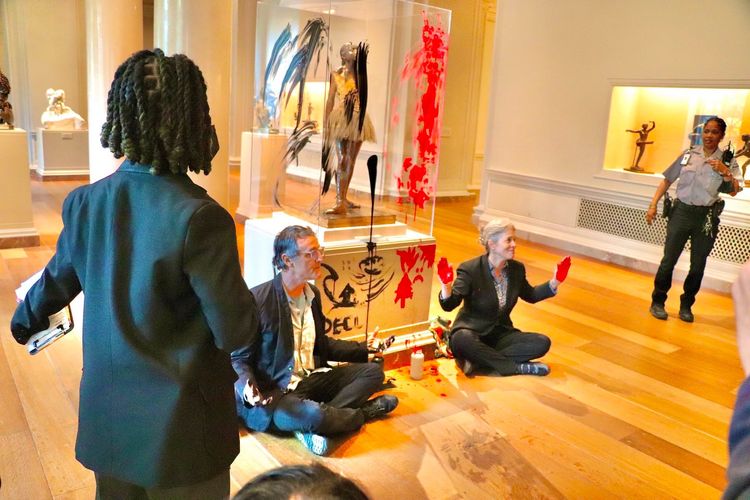Don't Wait Until It Becomes a Crisis
Don’t Wait Until It Becomes a Crisis
By Mary Annaïse Heglar
If you read this newsletter, I trust that you’re aware that American democracy is in deep shit. But even though there’s been article after article about how perilously close we are to authoritarianism and/or fascism, there’s this pesky theory running around that you can’t campaign on democracy because people “don’t understand it.”
Sigh.
There’s two huge underlying problems with this argument. First, it tells me that the people who want to be in charge of making the policies to guide this nation (which is, unfortunately, the most powerful in the world) are lazy as fuck. If preserving democracy is the most important issue facing this country, then you need to say that. If you think people don’t understand, then you need to do the work and MAKE THE MOTHERFUCKING CASE! Like it or not, this is part of the job, sweetie!
It’s not lost on me that just a couple of election cycles ago, these same Very Smart People said the same thing about climate change. Where exactly did that get us? To the crisis point. Please, just this once, can we NOT wait until it’s a crisis?
Here’s the other problem: the people who want to govern (and the people who advise them) clearly think the American public is stupid. As Rhiana Gunn Wright said on our post-election show in 2020, “People aren’t stupid, they’re busy.” I’d add that they’re misinformed and miseducated, and that’s because of the underinvestment in schools and the media industry, which is the result of policy decisions made by these very same people who think they can’t talk to their constituents like adults.
And these same people will sit around and wonder why someone like Joe Rogan is so popular. Look Joe Rogan might be a racist, sexist, transphonic, irresponsible shit, but he doesn’t talk down to his audience. He doesn’t tell them that an issue is too complicated for them to understand. Because, guess what? NO ONE LIKES THAT.
If you wanna lead people, the least you can do is respect them enough to tell them the truth. Otherwise, maybe it’s not that we’re stupid. Maybe you’re just not qualified for the job.
Climate Therapy and Reparations
By Mary Annaïse Heglar
My therapist and I experienced two very important and very different “firsts” at the same time: her first pregnancy and my first bout with climate grief. I saw how happy she was with her growing family and how comforted she was to know that I was working in the environmental field. I knew she didn’t know how bad it was.
I watched her belly get bigger and bigger while my nightmares of rising seas and gathering storms became more and more vivid. By the time she went on maternity leave, they weren’t nightmares anymore. They’d become more like visions, in which a normal New York City street was upended by a tornado and everyone just kept on walking, or where the subway car I rode in filled with water but no one looked up from their books and the breakdancers didn’t miss a beat.
While she was away, I was matched with a temporary therapist and eventually I told him about my climate grief for three main reasons: (1) he didn’t have the base of knowledge to help me with my deeper traumas, (2) he wasn’t expecting a child, and (3) if he thought I was crazy, at least I wouldn’t have to see that look on his eyes for too long. To my relief, he didn’t look at me like I was crazy. But he also didn’t know how to help, and spent the entirety of our last visit begging me to tell my regular therapist. He swore she had the resilience to bear it, but all I could think about was her child, and I couldn’t bring myself to ruin her ideas about their future.
There was another reason I didn’t want to tell her. By the time she got back, I’d read the story of an environmental activist who told his therapist about his concerns about climate change and she assumed he was paranoid and delusional. He wound up diagnosed as bipolar and put on a lithium dosage so high he drooled. I didn’t want that. Plus, I had no shortage of Other Shit to work through.
Keep in mind that this was all in 2015, and today’s climate grief is…different. For one thing, climate change is tangible now, no longer theoretical. It’s in the headlines. “Back then”—just seven years ago—it lived in wonky reports and charts. Today, it’s a lot harder to tell someone they’re delusional or paranoid about the crisis on the horizon because it’s not on the horizon anymore. Maybe that’s why the mental health industry is finally taking it seriously, as evidenced by last week's New York Times article on it.
But, as I’ve said on Twitter, if the mental health industry is finally going to take climate grief seriously, it needs to take a critical look at all the ways it’s failed, and all the people it’s hurt, in the extremely recent past. I’ve heard so many horror stories of therapists who wound up gaslighting and silencing their patients due to their own shitty knowledge about the crisis. They tried to convince them that it was all in their heads, that they had a savior complex, that they were catastrophizing. Those people are owed reparations, preferably in the form of free and better therapy for the rest of their lives. It takes a lot to heal from being shut down by the very person YOU PAY to open you up.
When I finally did tell my therapist, I wouldn’t say she gaslit me, but I did have to spend time consoling her as she faced the enormity of the crisis for the first time. For one thing, she, like most people, did not know that the globe had already warmed by more than 1 degree Celsius. After that, I rarely brought up climate change again because it was clear that I was more equipped to deal with it than she was.
And that brings me to the real heart of the matter: the fact that the mental health field has failed so horrifically is yet more evidence of the woeful miseducation of the entire American public. Of course my therapist didn’t know how serious climate change was: no one had told her. Up until recently, the severity of the climate crisis was treated as highly confidential information that couldn’t be shared with the public for fear they’d freak out and shut down. It wasn’t my job as her patient to tell her—or even her professors or her colleagues. That job falls to the media, and to our elected officials. It is up to them to decide what is important and to tell the truth about it. They failed, and these are just some of the consequences.
Climate Coverage Is Exploding (Fingers Crossed)
By Amy Westervelt
Dare we believe that the media is finally really going to treat climate like that thing they've been saying it is for years: the most important story of our time? I gotta tell you, the numbers look pretty good! In 2021, coverage didn't just surpass 2020's anemic numbers, it beat out all the years before it. And while January 2022 was a slight drop from December 2021 (probably at least partly due to all the "year-end, looking ahead" stories), it delivered an 11 percent increase in coverage from January 2021.
Moreover, major national media outlets are hiring more and more climate reporters. In the past few months, The New York Times has pulled in writers from its Culture and Technology desks to climate, and announced this past week that reporter Somini Sengupta will be taking over their Climate Fwd newsletter. Somini brings a climate justice approach to all of her stories, so we're excited to see what she does with the newsletter. And then The Washington Post blew everyone away this week with an announcement that it plans to add 20 new positions to its climate desk.
The quantity is great, and we hope to see the quality match it. As I've said before, the media has gone through a couple of these sorts of cycles, going big on climate only to ratchet back again two years later. And then we've also seen outlets announce big climate initiatives only to deliver on those with… a single newsletter. The media also has a lot of making up to do. In the many many conversations around climate disinformation, the media still has a tendency to let itself off the hook. But guess what! You can't spread disinformation without a distribution mechanism, without enablers. The media has been complicit in a whole lot of delay on climate action and not only has it not acknowledged or addressed that role, it's still embracing conventions like "objectivity" that made it so easy for oil companies to manipulate them for all those decades.
We're hoping to see climate stories that cut across multiple other subjects, that really explore the root causes of the problem, and that start to shine some light on that whole "political will" question we're always hear so much about. And we're cautiously optimistic!
Digest
Your weekly round-up of climate coverage.
Rising Temperatures, Rising Tides
Americans Are in Total Denial About Flooding by Liza Featherstone for Earther
A third of Americans are already facing above-average warming | Climate crisis | The Guardian by Oliver Milman for the Guardian
Climate Change Is Stretching Mumbai to Its Limit by Vaishnavi Chandrashekhar for the Atlantic
Water Supplies From Glaciers May Peak Sooner Than Anticipated by Raymond Zhong for The New York Times
Climate change brings thinner, more unstable ice to the Great Lakes by Diana Kruzman for Grist
How the speed of climate change is unbalancing the insect world bWritten by Oliver Milman, read by Elinor Coleman and produced by Hattie Moir for the Guardian
The Climate Presidency?
The U.S. Army Has a New Dystopian Plan to Deal With Climate Catastrophe by Angely Mercado for Earther
Congress Would Rather Spend Money on China Anxiety Than Climate Change by Kate Aronoff for The New Republic
A Climate Opportunity - The New York Times by German Lopez for the New York Times
How Billions in Infrastructure Funding Could Worsen Global Warming by Brad Plumer for The New York Times
Biden's Biggest Idea on Climate Change Is Remarkably Cheap by Robinson Meyer for the Atlantic
Cleaning up after the toxic refuse of abandoned coal mines by Julia Kane
Judge blocks key Biden climate metric by Niina H. Farah for E&E News
'Decimation' of competitive seats could unleash climate primaries - E&E News by Adam Aton for E&E News
Climate Accountability
Fossil Fuel Companies Have the Nerve to Claim That Taxing Them Will Hurt the Climate by Kate Aronoff for The New Republic
The end of natural gas has to start with its name by Rebecca Leber for Vox
The US Has a Plan to Fix Puerto Rico's Dangerously Busted Energy Grid by Angely Mercado for Earther
Google, Walmart, and Other Big Companies Are Half-Assing Their Climate Plans by Molly Taft for Earther
The natural gas industry is ready for a net-zero future — as long as it still includes pipelines by Emily Pontecorvo for Grist
ALEC Is Driving Laws to Blacklist Companies That Boycott the Oil Industry | The Nation by Chris McGreal for the Nation
BP has ambitious plans to move beyond fossil fuels – but are they enough? by Jillian Ambrose for the Guardian
Manchin wants 'good things on climate.' What does that mean? - The Washington Post by Maxine Joselow for The Washington Post
Climate change: Top companies exaggerating their progress - study by Georgina Rannard for the BBC News
Justice Is Justice Is Justice
The Environmental Movement Isn't Ready for Transphobia by Molly Taft for Earther
Wet'suwet'en land defenders call on United Nations to visit proposed pipeline by Joseph Lee for Grist
Rihanna Drops $15 Million on Climate Justice by Angely Mercado for Earther
Germany Has a New Climate Envoy: an American Greenpeace Activist by Christopher F. Schuetze for The New York Times
Ecuador's Indigenous Groups Have New Power to Protect Their Lands from Destruction by Angely Mercado for Earther
The world's poorest bear the burden of heat — and it's getting worse by Lina Tran for Grist
Texas primaries test Green New Deal champions by Timothy Cama for E&E News
For Climate Justice In Africa, Rich Nations Must Admit To Past Wrongs, Climate Experts Hear by David Vetter for Forbes
Climate change will be expensive. Who should pay? - POLITICO by Lorraine Woellert for the Politico
Climate in Culture
How the view from space might be key to saving the planet by Kate Yoder
Don't Get Mad at Me When Don't Look Up Wins Best Picture, by Allison Wilmore for Vulture
Climate Change Enters the Therapy Room by Ellen Barry for The New York Times
Glimmers of Hope
Coal-Loving Australia Just Hit Wind and Solar Power Records by Moll Taft for Earther
This iron and water battery could power a more renewable grid by Jess Nichols for Grist
GM Will Invest $7 Billion in EV Batteries and Electric Trucks by Mack DeGeurin for Earther
Plus More
Can paying farmers to stop farming save the planet? Experts aren't so sure. by Lina Tran for Grist
Lessons from New York: What makes a community turn against climate adaptation? by Zoya Teirstein for Grist
Identify A-ha moments to trigger fast climate action, say UK scientists by Damian Carrington for the Guardian
Why outdated rainfall records are blocking cities' climate change preparations : NPR by Lauren Sommer for the NPR
Don't Sabotage the Climate Movement by Turning to Violence | The Nation by Paul Hockenos for the Nation





Only paid subscribers can comment.
Please subscribe or sign in to join the conversation.